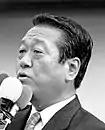2014 Japanese general election
General elections were held in Japan on 14 December 2014. Voting took place in all Representatives constituencies of Japan including proportional blocks to elect the members of the House of Representatives, the lower house of the National Diet of Japan. As the cabinet resigns in the first post-election Diet session after a general House of Representatives election (Constitution, Article 70), the lower house election also led to a new election of the prime minister in the Diet, won by incumbent Shinzō Abe, and the appointment of a new cabinet (with some ministers re-appointed). The voter turnout in this election remains the lowest in Japanese history.
| ||||||||||||||||||||||||||||||||||||||||||||||||||||||||||||||||||||||||||||||||||||||||||||||||||||||||||||
All 475 seats in the House of Representatives of Japan 238 seats needed for a majority | ||||||||||||||||||||||||||||||||||||||||||||||||||||||||||||||||||||||||||||||||||||||||||||||||||||||||||||
|---|---|---|---|---|---|---|---|---|---|---|---|---|---|---|---|---|---|---|---|---|---|---|---|---|---|---|---|---|---|---|---|---|---|---|---|---|---|---|---|---|---|---|---|---|---|---|---|---|---|---|---|---|---|---|---|---|---|---|---|---|---|---|---|---|---|---|---|---|---|---|---|---|---|---|---|---|---|---|---|---|---|---|---|---|---|---|---|---|---|---|---|---|---|---|---|---|---|---|---|---|---|---|---|---|---|---|---|---|
| Turnout | 52.65% | |||||||||||||||||||||||||||||||||||||||||||||||||||||||||||||||||||||||||||||||||||||||||||||||||||||||||||
| ||||||||||||||||||||||||||||||||||||||||||||||||||||||||||||||||||||||||||||||||||||||||||||||||||||||||||||
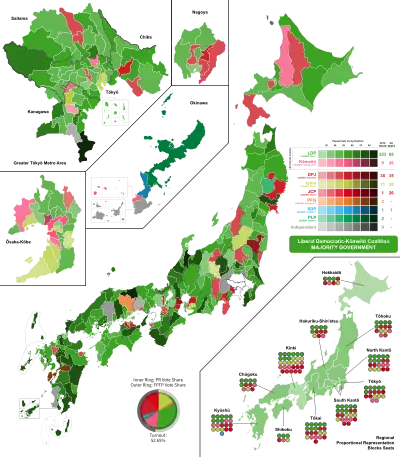 districts and PR districts, shaded according to winners' vote strength. | ||||||||||||||||||||||||||||||||||||||||||||||||||||||||||||||||||||||||||||||||||||||||||||||||||||||||||||
| ||||||||||||||||||||||||||||||||||||||||||||||||||||||||||||||||||||||||||||||||||||||||||||||||||||||||||||
| This article is part of a series on |
| Politics of Japan |
|---|
 |
|
|
Background
In 2012, the Democratic Party government under Yoshihiko Noda decided to raise the Japanese consumption tax. This unpopular moved allowed the Liberal Democratic Party under Shinzo Abe to regain control of the Japanese government in the 2012 Japanese general election. Abe proceeded to implement a series of economic programs known as "Abenomics" in a bid to stimulate the economy. Despite these programs, Japan entered a technical recession in mid-2014, which Abe blamed on the consumption tax hike, even though many members of the LDP supported the hike. Abe called a snap election on November 18, in part for the purpose of winning LDP backing to postpone the hike and pursue the Abenomics package.[1][2]
The LDP government was widely expected to win the election in a landslide, and many observers viewed the snap election as a mechanism for Abe to entrench his government at a time of relative popularity.[3]
Under 2013 changes to the electoral law designed to reduce malapportionment, district boundaries in 17 prefectures were redrawn and five districts are eliminated without replacement (one each in Fukui, Yamanashi, Tokushima, Kōchi and Saga). The number of first-past-the-post seats is reduced to 295, the total number of seats decreases to 475.[4]
Opinion polls
- Parties' approval ratings from 2013–14
(Source: NHK)
| Date | Lead | ||||||||||||||||
|---|---|---|---|---|---|---|---|---|---|---|---|---|---|---|---|---|---|
| LDP | DPJ | JRP | PFG | NKP | YP | PLP | JCP | SDP | GW | NRP | UP | JIP | Other | No Party | Undecided | ||
| 5–7 December | 38.1% | 11.7% | 0.1% | 5.9% | 0.3% | 4.3% | 0.9% | 0.0% | 3.7% | 0.1% | 26.3% | 8.5% | 11.8% | ||||
| 7–9 November | 36.6% | 7.9% | 0.2% | 2.2% | 0.0% | 0.0% | 3.5% | 0.6% | 1.2% | 0.1% | 40.0% | 7.7% | 3.4% | ||||
| 11–13 October | 40.2% | 5.6% | 0.1% | 4.1% | 0.5% | 0.1% | 3.3% | 0.9% | 1.4% | 0.1% | 35.0% | 8.8% | 5.2% | ||||
| 5–7 September | 40.4% | 5.4% | 0.7% | 0.1% | 4.3% | 0.0% | 0.2% | 3.3% | 0.5% | 0.1% | 0.4% | 36.9% | 7.8% | 3.5% | |||
| 8–10 August | 36.7% | 6.4% | 1.0% | 0.3% | 3.0% | 0.2% | 0.3% | 3.2% | 0.7% | 0.0% | 0.0% | 39.4% | 8.8% | 2.7% | |||
| 11–13 July | 34.3% | 4.8% | 1.7% | 3.6% | 0.5% | 0.3% | 3.4% | 0.9% | 0.1% | 0.3% | 42.5% | 7.6% | 8.2% | ||||
| 6–8 June | 36.9% | 5.1% | 1.1% | 4.0% | 0.4% | 0.1% | 2.8% | 0.6% | 0.0% | 0.1% | 42.4% | 6.7% | 5.5% | ||||
| 9–11 May | 41.4% | 5.6% | 1.1% | 3.7% | 0.2% | 0.3% | 2.4% | 0.9% | 0.2% | 0.1% | 37.2% | 6.9% | 4.2% | ||||
| 11–13 April | 38.1% | 7.4% | 1.3% | 3.4% | 0.9% | 0.2% | 3.6% | 0.6% | 0.1% | 0.2% | 37.2% | 5.2% | 0.9% | ||||
| 7–9 March | 38.7% | 6.5% | 1.1% | 2.2% | 0.8% | 0.1% | 3.3% | 0.8% | 0.4% | 0.1% | 40.0% | 5.2% | 1.3% | ||||
| 7–9 February | 36.2% | 5.8% | 1.3% | 3.9% | 1.1% | 0.3% | 3.3% | 1.4% | 0.5% | 0.2% | 41.0% | 5.2% | 4.8% | ||||
| 11–13 January | 40.4% | 5.8% | 1.6% | 2.8% | 0.8% | 0.1% | 1.6% | 0.7% | 0.1% | 0.3% | 40.3% | 5.5% | 0.1% | ||||
| 2014 | |||||||||||||||||
| 6–8 December | 36.7% | 7.8% | 2.1% | 2.8% | 1.2% | 0.2% | 3.1% | 0.6% | 0.0% | 38.7% | 6.8% | 2.0% | |||||
| 8–10 November | 41.9% | 5.2% | 1.8% | 4.4% | 1.9% | 0.3% | 3.3% | 0.4% | 0.3% | 35.1% | 5.6% | 6.8% | |||||
| 12–14 October | 36.1% | 5.2% | 2.1% | 3.8% | 1.2% | 0.2% | 4.0% | 0.5% | 0.3% | 41.8% | 4.9% | 5.7% | |||||
| 6–8 September | 40.3% | 5.5% | 2.2% | 4.4% | 2.1% | 0.0% | 3.2% | 0.7% | 0.2% | 34.6% | 6.8% | 5.7% | |||||
| 9–11 August | 37.9% | 7.3% | 4.6% | 4.6% | 3.2% | 0.2% | 3.5% | 0.8% | 0.9% | 30.8% | 6.2% | 7.1% | |||||
| 5–7 July | 42.5% | 8.0% | 2.7% | 5.3% | 3.1% | 0.5% | 3.7% | 0.9% | 0.1% | 0.0% | 0.3% | 24.5% | 8.4% | 18.0% | |||
| 7–9 June | 41.7% | 5.8% | 1.5% | 5.1% | 1.5% | 0.1% | 2.2% | 0.4% | 0.0% | 0.0% | 0.2% | 34.6% | 7.0% | 7.1% | |||
| 10–12 May | 43.4% | 5.3% | 2.4% | 3.7% | 2.3% | 0.3% | 2.0% | 1.1% | 0.0% | 0.0% | 0.1% | 33.3% | 6.1% | 10.1% | |||
| 5–7 April | 43.6% | 6.1% | 2.1% | 3.7% | 1.3% | 0.4% | 2.0% | 0.7% | 0.0% | 0.0% | 0.1% | 34.5% | 5.6% | 9.1% | |||
| 8–10 March | 40.1% | 7.0% | 3.9% | 4.4% | 3.1% | 0.3% | 2.1% | 0.6% | 0.0% | 0.0% | 0.1% | 31.8% | 6.6% | 8.3% | |||
| 10–12 February | 40.4% | 7.0% | 5.3% | 3.1% | 2.6% | 0.3% | 2.1% | 0.8% | 0.1% | 0.0% | 0.3% | 31.7% | 6.3% | 8.7% | |||
| 12–14 January | 37.8% | 7.6% | 6.5% | 4.0% | 3.7% | 0.5% | 2.7% | 0.8% | 0.0% | 0.0% | 0.3% | 30.8% | 5.4% | 7.0% | |||
| 2013 | |||||||||||||||||
- Cabinet approval/disapproval ratings
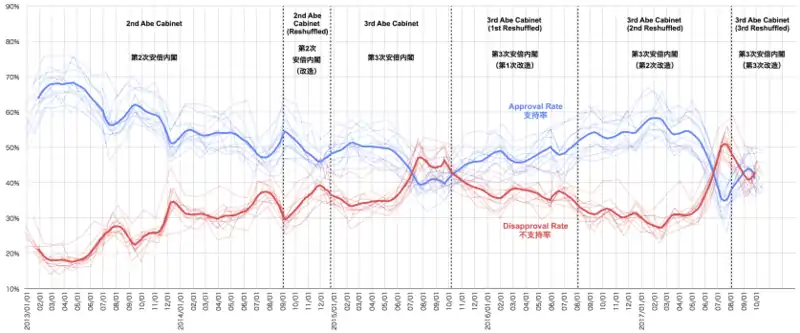
| Date | PM | ||
|---|---|---|---|
| Approval | Disapproval | ||
| 5–7 December | Shinzo Abe | 47% | 38% |
| 7–9 November | Shinzo Abe | 44% | 38% |
| 11–13 October | Shinzo Abe | 52% | 34% |
| 5–7 September | Shinzo Abe | 58% | 28% |
| 8–10 August | Shinzo Abe | 51% | 33% |
| 11–13 July | Shinzo Abe | 47% | 38% |
| 6–8 June | Shinzo Abe | 52% | 32% |
| 9–11 May | Shinzo Abe | 56% | 29% |
| 11–13 April | Shinzo Abe | 52% | 31% |
| 7–9 March | Shinzo Abe | 51% | 30% |
| 7–9 February | Shinzo Abe | 52% | 33% |
| 11–13 January | Shinzo Abe | 54% | 31% |
| 2014 | |||
| 21–22 December[5] | Shinzo Abe | 49% | 34% |
| 6–8 December | Shinzo Abe | 50% | 35% |
| 8–10 November | Shinzo Abe | 60% | 25% |
| 12–14 October | Shinzo Abe | 58% | 26% |
| 6–8 September | Shinzo Abe | 59% | 23% |
| 9–11 August | Shinzo Abe | 57% | 29% |
| 5–7 July | Shinzo Abe | 57% | 25% |
| 7–9 June | Shinzo Abe | 62% | 20% |
| 10–12 May | Shinzo Abe | 65% | 18% |
| 5–7 April | Shinzo Abe | 66% | 19% |
| 23–24 March[6] | Shinzo Abe | 69% | 6% |
| 9–10 March[7] | Shinzo Abe | 76% | 22% |
| 8–10 March | Shinzo Abe | 66% | 18% |
| 10–12 February | Shinzo Abe | 64% | 20% |
| 8–10 February[8] | Shinzo Abe | 71% | 18% |
| 12–14 January | Shinzo Abe | 64% | 22% |
| 11–13 January[8] | Shinzo Abe | 68% | 24% |
| 2013 | |||
Results
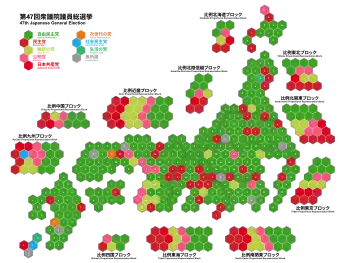
The LDP lost a small number of seats but slightly enlarged its majority coalition with Komeito. Turnout was a record low, and many voters viewed the election as a waste of time and money. DPJ president Banri Kaieda lost his seat in Tokyo while the Japanese Communist Party doubled in strength.[9][10] The right-leaning Japan Innovation Party and Party for Future Generations lost seats.[11]
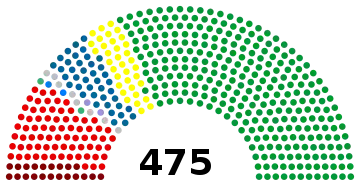 | |||||||||
|---|---|---|---|---|---|---|---|---|---|
| Party | Proportional | Constituency | Total seats | +/– | |||||
| Votes | % | Seats | Votes | % | Seats | ||||
| Liberal Democratic Party | 17,658,916 | 33.11 | 68 | 25,461,449 | 48.10 | 223 | 291 | –3 | |
| Democratic Party of Japan | 9,775,991 | 18.33 | 35 | 11,916,849 | 22.51 | 38 | 73 | +16 | |
| Japan Innovation Party | 8,382,699 | 15.72 | 30 | 4,319,646 | 8.16 | 11 | 41 | New | |
| Komeito | 7,314,236 | 13.71 | 26 | 765,390 | 1.45 | 9 | 35 | +4 | |
| Japanese Communist Party | 6,062,962 | 11.37 | 20 | 7,040,170 | 13.30 | 1 | 21 | +13 | |
| Party for Future Generations | 1,414,919 | 2.65 | 0 | 947,396 | 1.79 | 2 | 2 | New | |
| Social Democratic Party | 1,314,441 | 2.46 | 1 | 419,347 | 0.79 | 1 | 2 | 0 | |
| People's Life Party | 1,028,721 | 1.93 | 0 | 514,575 | 0.97 | 2 | 2 | New | |
| Happiness Realization Party | 260,111 | 0.49 | 0 | 0 | 0 | ||||
| Shiji Seitō Nashi | 104,854 | 0.20 | 0 | 0 | New | ||||
| New Renaissance Party | 16,597 | 0.03 | 0 | 0 | 0 | ||||
| Genzei Nippon | 32,759 | 0.06 | 0 | 0 | New | ||||
| Future Party | 4,883 | 0.01 | 0 | 0 | New | ||||
| Katsuko Inumaru and Republican Party | 4,668 | 0.01 | 0 | 0 | 0 | ||||
| World Economic Community Party | 1,416 | 0.00 | 0 | 0 | 0 | ||||
| Independents | 1,511,242 | 2.85 | 8 | 8 | +3 | ||||
| Total | 53,334,447 | 100.00 | 180 | 52,939,790 | 100.00 | 295 | 475 | –5 | |
| Valid votes | 53,334,447 | 97.45 | 52,939,790 | 96.71 | |||||
| Invalid/blank votes | 1,398,283 | 2.55 | 1,801,562 | 3.29 | |||||
| Total votes | 54,732,730 | 100.00 | 54,741,352 | 100.00 | |||||
| Registered voters/turnout | 103,962,785 | 52.65 | 103,962,784 | 52.65 | |||||
| Source: Ministry of Internal Affairs and Communications, CLEA | |||||||||
By prefecture
| Prefecture | Total seats |
Seats won | ||||||||
|---|---|---|---|---|---|---|---|---|---|---|
| LDP | DPJ | JIP | Komeito | PFG | PLP | JCP | SDP | Ind. | ||
| Aichi | 15 | 8 | 6 | 1 | ||||||
| Akita | 3 | 3 | ||||||||
| Aomori | 4 | 4 | ||||||||
| Chiba | 13 | 11 | 2 | |||||||
| Ehime | 4 | 4 | ||||||||
| Fukui | 2 | 2 | ||||||||
| Fukuoka | 11 | 11 | ||||||||
| Fukushima | 5 | 3 | 1 | 1 | ||||||
| Gifu | 5 | 5 | ||||||||
| Gunma | 5 | 5 | ||||||||
| Hiroshima | 7 | 6 | 1 | |||||||
| Hokkaido | 12 | 8 | 3 | 1 | ||||||
| Hyōgo | 12 | 7 | 1 | 1 | 2 | 1 | ||||
| Ibaraki | 7 | 5 | 1 | 1 | ||||||
| Ishikawa | 3 | 3 | ||||||||
| Iwate | 4 | 1 | 2 | 1 | ||||||
| Kagawa | 3 | 2 | 1 | |||||||
| Kagoshima | 5 | 4 | 1 | |||||||
| Kanagawa | 18 | 13 | 2 | 1 | 1 | 1 | ||||
| Kōchi | 2 | 2 | ||||||||
| Kumamoto | 5 | 4 | 1 | |||||||
| Kyoto | 6 | 4 | 2 | |||||||
| Mie | 5 | 3 | 2 | |||||||
| Miyagi | 6 | 5 | 1 | |||||||
| Miyazaki | 3 | 3 | ||||||||
| Nagano | 5 | 3 | 1 | 1 | ||||||
| Nagasaki | 4 | 4 | ||||||||
| Nara | 4 | 3 | 1 | |||||||
| Niigata | 6 | 5 | 1 | |||||||
| Ōita | 3 | 2 | 1 | |||||||
| Okayama | 5 | 4 | 1 | |||||||
| Okinawa | 4 | 1 | 1 | 1 | 1 | |||||
| Osaka | 19 | 9 | 1 | 5 | 4 | |||||
| Saga | 2 | 1 | 1 | |||||||
| Saitama | 15 | 12 | 2 | 1 | ||||||
| Shiga | 4 | 4 | ||||||||
| Shimane | 2 | 2 | ||||||||
| Shizuoka | 8 | 6 | 2 | |||||||
| Tochigi | 5 | 4 | 1 | |||||||
| Tokushima | 2 | 2 | ||||||||
| Tokyo | 25 | 22 | 1 | 1 | 1 | |||||
| Tottori | 2 | 2 | ||||||||
| Toyama | 3 | 3 | ||||||||
| Wakayama | 3 | 2 | 1 | |||||||
| Yamagata | 3 | 3 | ||||||||
| Yamaguchi | 4 | 4 | ||||||||
| Yamanashi | 2 | 1 | 1 | |||||||
| Total | 295 | 223 | 38 | 11 | 9 | 2 | 2 | 1 | 1 | 8 |
By PR block
| PR block | Total seats |
Seats won | |||||
|---|---|---|---|---|---|---|---|
| LDP | DPJ | JIP | Komeito | JCP | SDP | ||
| Chūgoku | 11 | 5 | 2 | 1 | 2 | 1 | |
| Hokkaido | 8 | 3 | 2 | 1 | 1 | 1 | |
| Hokuriku–Shinetsu | 11 | 5 | 3 | 1 | 1 | 1 | |
| Kinki | 29 | 9 | 4 | 8 | 4 | 4 | |
| Kyushu | 21 | 8 | 3 | 3 | 4 | 2 | 1 |
| Northern Kanto | 20 | 8 | 4 | 3 | 3 | 2 | |
| Shikoku | 6 | 3 | 1 | 1 | 1 | ||
| Southern Kanto | 22 | 8 | 4 | 4 | 3 | 3 | |
| Tohoku | 14 | 5 | 4 | 2 | 2 | 1 | |
| Tokai | 21 | 8 | 5 | 3 | 3 | 2 | |
| Tokyo | 17 | 6 | 3 | 3 | 2 | 3 | |
| Total | 180 | 68 | 35 | 30 | 26 | 20 | 1 |
Notable losses
The most high-profile LDP candidate to lose re-election is Agriculture Minister Koya Nishikawa, who lost by 199 votes (0.2%) to former Governor of Tochigi Akio Fukuda.[12] He was questioned in October after allegedly receiving financial support from a fraudulent company.[13]
Amongst the DPJ members to lose their seats were party leader Banri Kaieda.[14] Party for Future Generations leader Shintaro Ishihara was also unsuccessful in his attempt to win a seat after receiving a low position on his party's representative ballot.[14]
Former leader of the now-dissolved Your Party and six-term representative for Tochigi-3rd district Yoshimi Watanabe was also defeated.[15]
The JCP gained its first single-seat constituency seat since the 1996 election. Amidst a growing anti-base movement in Okinawa, JCP candidate Seiken Akamine unseated LDP incumbent Kōnosuke Kokuba in a night marked with a nationwide JCP surge.[16]
Representatives
Members of House of Representatives elected from single-seat constituency
LDP Komei DPJ JIP JCP SDP PLP PFG Independent
By-election
| Year | Month and date | District | Winner | Party | Vacancy | Party | Notes |
|---|---|---|---|---|---|---|---|
| 2015 | ー | There was a reason for the implementation, but it was originally scheduled to hold a by-election in Hokkaido 5th district, but it was postponed to the next election due to apportionment lawsuit. There were no national elections in 2015. | |||||
| 2016 | April 24 | Hokkaido-5th | Yoshiaki Wada | LDP | Nobutaka Machimura | LDP | Machimura died on June 1, 2015. |
| Kyoto-3rd | Kenta Izumi | DP | Kensuke Miyazaki | LDP | Miyazaki resigned as a member of the House of Representatives on February 16, 2016 to take responsibility for his adultery. | ||
| October 23 | Fukuoka-6th | Jiro Hatoyama | Independent | Kunio Hatoyama | LDP | Hatoyama died on June 21, 2016. | |
| Tokyo-10th | Masaru Wakasa | LDP | Yuriko Koike | LDP | Koike resigned as a member of the House of Representatives July 14, 2016 to run for 2016 Tokyo gubernatorial election. | ||
| 2017 | ー | Aomori-4th | ー | ー | Tarō Kimura | LDP | Kimura died on July 25, 2017. |
| Niigata-5th | ー | ー | Tadayoshi Nagashima | LDP | Nagashima died on August 18, 2017. | ||
| Ehime-3rd | ー | ー | Toru Shiraishi | LDP | Shiraishi died on March 17, 2017. | ||
- By-election for Aomori 4th district, Niigata 5th district, and Ehime 3rd district was scheduled to be held in October 2017, but by-election was canceled because the House of Representatives was dissolved and 2017 Japanese general election was held.
Members of House of Representatives elected from proportional representation block
LDP Komei DPJ JIP JCP SDP
People who were elected in PR following the resignation of another member of the House of Representatives
| Year | Month | block | Winner | Party | Vacancy | Notes |
|---|---|---|---|---|---|---|
| 2015 | October | Kinki | Tamotsu Shiiki | JIP | Hirofumi Yoshimura | Yoshimura resigned as a member of the House of Representatives on October 1, 2015, to run for 2015 Osaka mayoral election. |
| 2016 | April | Kinki | Keiro Kitagaki | DPJ | Kenta Izumi | Izumi lost his job as a member of the House of Representatives on April 12, 2016, to run for the by-election in Kyoto 3rd district. |
| October | Tokyo | Tsuyoshi Tabata | LDP | Masaru Wakasa | Wakasa lost his job as a member of the House of Representatives October 11, 2016, to run for the by-election in Tokyo 10th district. | |
| 2017 | July | Tohoku | Izumi Yoshida | DPJ | Kazuko Kōri | Kōri lost her job as a member of the House of Representatives on July 9, 2017, to run for 2017 Sendai mayoral election. |
Aftermath
In November 2015, the Grand Bench of the Supreme Court ruled that the inequality in vote weight due to malapportionment was still in an unconstitutional state (iken jōtai); however, as in previous such rulings, it dismissed the demand to invalidate the election.[17][18]
References
- Wakatabe, Masazumi. "Election With A Cause: Why Japan's Prime Minister Shinzo Abe Must Call General Election Now". Forbes. Retrieved 2016-07-14.
- McCurry, Justin (2014-11-18). "Japan calls snap election". the Guardian. Retrieved 2016-07-14.
- Boyd, John. "Japan's unwanted election: Why now?". www.aljazeera.com. Retrieved 2016-07-14.
- Ministry of Internal Affairs and Communications: 衆議院小選挙区の区割りの改定等について
- "Approval rating for Abe Cabinet falls below 50% for 1st time since inauguration: Mainichi poll (in English)". Mainichi Shimbun. 24 December 2013. Archived from the original on 6 January 2014. Retrieved 5 January 2014.
- "【産経・FNN合同世論調査】安倍内閣支持69・6%に上昇 鳩山内閣発足時を超える". MSN産経ニュース. Archived from the original on 2013-03-03. Retrieved 2013-03-24.
- TBS/JNN
- 内閣支持率71%、2回連続上昇...読売世論調査
- "Abe coalition secures big Japan election win with record low turnout". Reuters. 2014-12-15. Retrieved 2016-07-14.
- "Japan election: Voters back Shinzo Abe as PM wins new term - BBC News". BBC News. 14 December 2014. Retrieved 2016-07-14.
- "Romping home". The Economist. ISSN 0013-0613. Retrieved 2016-07-14.
- NHK(Japan Broadcasting Corporation). "NHK2014衆院選".
- "Sukyandaru: Shinzo Abe's plan to raise the profile of women in his cabinet is in tatters". The Economist. 25 October 2014.
- "Abe tightens grip on power as ruling coalition wins 325 seats in Lower House election". The Japan Times. 15 December 2014.
- "Ex-Your Party leader Watanabe, ex-Tokyo Gov. Ishihara to lose seats". mainichi.jp. Archived from the original on 2014-12-15.
- Aoki, Mizuho (15 December 2014). "Resurgent JCP has night to remember". Japan Times. Retrieved 11 December 2017.
- Nihon Keizai Shimbun, November 25, 2015: 14年衆院選、1票の格差は「違憲状態」 最高裁大法廷
- The Japan Times, November 25, 2015: Supreme Court says December election ‘in state of unconstitutionality,’ but won't nullify results
External links
![]() Media related to Japanese general election, 2014 at Wikimedia Commons
Media related to Japanese general election, 2014 at Wikimedia Commons
.jpg.webp)
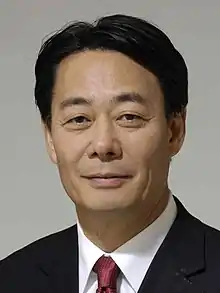
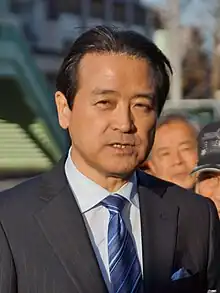


_2.jpg.webp)

